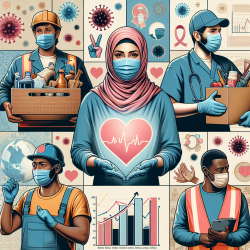Introduction
The COVID-19 pandemic has cast a spotlight on essential workers, highlighting their crucial role in maintaining societal infrastructure. While healthcare workers have been the focus of many studies, non-health essential workers such as those in grocery, delivery, and law enforcement sectors have received less attention. A recent study published in the International Journal of Environmental Research and Public Health explores the mental health and well-being needs of these workers during pandemics.
Research Findings
The study reviewed literature from the past 20 years, focusing on the mental health effects of six pandemics, including COVID-19. It found that non-health essential workers experienced increased levels of depression, anxiety, and stress. Contributing factors included inadequate training, lack of personal protective equipment (PPE), and insufficient support systems.
Key demographics affected included women, younger individuals, and those with lower educational backgrounds. These groups were more susceptible to mental health issues during pandemics, often due to increased work hours, financial strain, and fear of infecting loved ones.
Implications for Practitioners
For practitioners working with children, understanding the broader context of family stressors is crucial. Children of non-health essential workers may face increased anxiety and behavioral challenges due to their parents' stress. Practitioners should consider:
- Providing resources and support to families of non-health essential workers.
- Implementing programs that address coping strategies for stress and anxiety.
- Encouraging open communication within families about the challenges faced during pandemics.
Additionally, practitioners should advocate for policies that ensure adequate training and resources for non-health essential workers, which can indirectly benefit the mental health of their children.
Encouraging Further Research
The study highlights the need for more robust methodologies, such as longitudinal studies, to explore occupation-specific coping strategies. Practitioners and researchers are encouraged to delve deeper into these areas to develop targeted interventions that can improve outcomes for both workers and their families.
Conclusion
The mental health of non-health essential workers is a critical area that requires more attention, especially during pandemics. By understanding and addressing their needs, practitioners can play a vital role in supporting these workers and their families, ultimately leading to better outcomes for children.
To read the original research paper, please follow this link: Mental Health and Well-Being Needs among Non-Health Essential Workers during Recent Epidemics and Pandemics.










